CHAPTER THREE
SPIRIT OF COMMUNITY
The 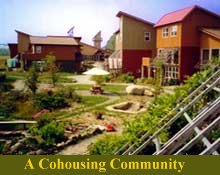 Third Blessing is
a dominion of love where everyone lives as one huge family. A family takes care of the
weak. A family is sensitive to the individual. The UC needs to create deep love between
the members as friends who will die for each other. This will only happen when members
live close together in trinities and groups of trinities. UC members in America haven't
lived in trinities because there was no stability. Everything was so mobile no one could
get roots and form a community. We have been like gypsies camped outside town. Now it's
time to go into Canaan and build a stronger community than others. It's
time to sink roots, instead of pulling them up. One of the curses of the UC and 20th
century America has been it mobility. The good side was that travel can help a person to
not get provincial and open up to other types of people. The negatives far outweigh the
positives in losing extended families and communities. For most people the grass wasn't greener on the other hill. Robert Nisbet in Twilight of
Authority says that America gave up its focus on local community and even disparaged
it in the 1920s. This is the trend I have written of in my books that show how America
threw out so many good things from the Victorians. Nisbet says, "World
War I is, I think, the sharp dividing line. Afterward interest in local community did not
attain its earlier intensity, flavor, and eloquence. The influence of
Third Blessing is
a dominion of love where everyone lives as one huge family. A family takes care of the
weak. A family is sensitive to the individual. The UC needs to create deep love between
the members as friends who will die for each other. This will only happen when members
live close together in trinities and groups of trinities. UC members in America haven't
lived in trinities because there was no stability. Everything was so mobile no one could
get roots and form a community. We have been like gypsies camped outside town. Now it's
time to go into Canaan and build a stronger community than others. It's
time to sink roots, instead of pulling them up. One of the curses of the UC and 20th
century America has been it mobility. The good side was that travel can help a person to
not get provincial and open up to other types of people. The negatives far outweigh the
positives in losing extended families and communities. For most people the grass wasn't greener on the other hill. Robert Nisbet in Twilight of
Authority says that America gave up its focus on local community and even disparaged
it in the 1920s. This is the trend I have written of in my books that show how America
threw out so many good things from the Victorians. Nisbet says, "World
War I is, I think, the sharp dividing line. Afterward interest in local community did not
attain its earlier intensity, flavor, and eloquence. The influence of 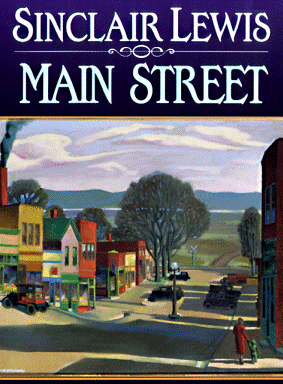 Woodrow Wilson and his New Freedom in this country and of Lenin
in European radical thought had a great deal to do with turning revolutionary and
progressive thought away from its concern with locality or, for that matter, any of the
smaller unities. The nation, the centralized nation freed of local community became the
symbol of reaction, dullness, mediocrity, and oppression of mind. Sinclair Lewis's Main Street, Babbitt, and other novels were only the
most popular of a literature in the 1920's that satirized, caricatured, and pilloried the
village or small town. And such rendering of local roots was in keeping with the
increasing nationalism to be seen in the social sciences, in education, and in government
policy from World War I on."
Woodrow Wilson and his New Freedom in this country and of Lenin
in European radical thought had a great deal to do with turning revolutionary and
progressive thought away from its concern with locality or, for that matter, any of the
smaller unities. The nation, the centralized nation freed of local community became the
symbol of reaction, dullness, mediocrity, and oppression of mind. Sinclair Lewis's Main Street, Babbitt, and other novels were only the
most popular of a literature in the 1920's that satirized, caricatured, and pilloried the
village or small town. And such rendering of local roots was in keeping with the
increasing nationalism to be seen in the social sciences, in education, and in government
policy from World War I on."
One of the great losses of the migration to the city was loss of love for nature.
Many people take care of their yard and do some gardening, but people need more than that
to nurture their spirit. Stressful two week vacations to national parks is not enough. The
UC should live in communities that have some acreage for adults to walk. The Victorians
would go on walks. Children need to run. And dogs need space too. We need to get back to
the rhythm of small communities where people know and care for each other. Some of my
greatest memories are time I spent on my grandparent's farm
eating an organic juicy peach right off the tree, gathering eggs, riding a horse, playing
in the barn, hunting for squirrels and rabbits as I walked along a stream. It is magic to
wake up to the sights and sounds of nature and a loving community.
MULTIPLES OF 10
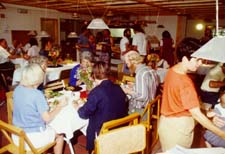 Let's play with numbers. If every UC
family had an average of ten children by themselves or by adopting, and each of those
children had 10 children, there would be 100 grandchildren. The next generation would be
1000, then 10,000, then 100,000 then one million. Within a few generations one couple
could have a large city of just their descendants. If every UC couple had more than 10
children, and I assume many would want to adopt from third world countries, just think of
the joy it would bring to God to save those children and to see His family become the most
powerful and exciting group on earth.
Let's play with numbers. If every UC
family had an average of ten children by themselves or by adopting, and each of those
children had 10 children, there would be 100 grandchildren. The next generation would be
1000, then 10,000, then 100,000 then one million. Within a few generations one couple
could have a large city of just their descendants. If every UC couple had more than 10
children, and I assume many would want to adopt from third world countries, just think of
the joy it would bring to God to save those children and to see His family become the most
powerful and exciting group on earth.
ECOLOGY
The UC needs to start building cities with lots of green space that supply most of
the food locally. This will end the terrible erosion and use of chemicals that
agribusiness uses because it thinks it has to use to make a profit. Planned communities
are more ecological. Fallen man is so inefficient. They should have dry toilets that
convert human waste to compost. This compost will not be used in gardens because it may
have deadly germs. It will be disposed of in a safe place in the acreage of the community.
Also, John Stossel of ABC News had an interesting segment about how dangerous organic food
can be because farmers and gardeners often use manure to fertilize the plants. Some people
have died eating organic food because it has deadly toxins like e-coli. It makes sense
that manure should never be used on plants that are for human consumption. Human compost
from dry toilets and manure should be used for such things as flowers or buried in ground
away from land used for farming.
M. Scott Peck said, "In and through community lies the salvation of the
world." More and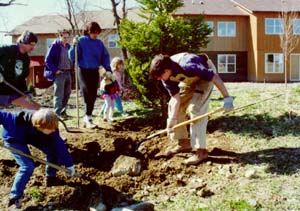 more people are
beginning to realize that life is better in a community. There are more and more books on
the subject. Carolyn Shaffer writes in Creating Community Anywhere: "Only two
or three generations ago, community was a fact of life for most people. Neighbors left
their doors open, helped each other build things, and kept an eye out for one another's
well-being. In 1930, less than eight percent of American households consisted of a single
person, and many families occupied the same house for generations."
more people are
beginning to realize that life is better in a community. There are more and more books on
the subject. Carolyn Shaffer writes in Creating Community Anywhere: "Only two
or three generations ago, community was a fact of life for most people. Neighbors left
their doors open, helped each other build things, and kept an eye out for one another's
well-being. In 1930, less than eight percent of American households consisted of a single
person, and many families occupied the same house for generations."
"Today, almost a quarter of U.S. households consist
of people living alone. Doors, literally and figuratively, are closed and locked to keep
out crime and strangers. Americans move so frequently that direct mail marketers consider
a two-year-old mailing list hopelessly out of date; more than thirty percent of the
addresses will have changed in that time. More and more women, who used to be the
caretakers of community while the men pursued 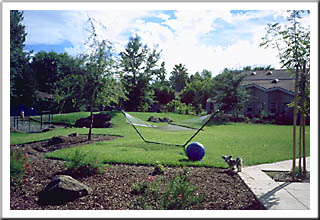 opportunities in the larger world, now find it necessary to work outside the
home as well. Neither women nor men feel they have much time to maintain the ties of
mutual support. It is commonplace for families as well as singles to have little or no
contact with others who live only a door or two away."
opportunities in the larger world, now find it necessary to work outside the
home as well. Neither women nor men feel they have much time to maintain the ties of
mutual support. It is commonplace for families as well as singles to have little or no
contact with others who live only a door or two away."
"Earlier generations relied upon family and community
for different functions than people do today. Not that many decades ago, relatives and
neighbors helped each other give birth at homes and eventually die there. They nursed one
another to health, took in orphaned children of brothers and sisters who died young, and
gave up personal ambitions to carry on the family business or to care for an aging parent.
Today, institutions and professionals have taken over many of these roles. People go to
hospitals, schools, and nursing homes to receive health care and education."
George Will wrote, "Clearly this nation, though steeped in the severe
individualism of the frontier notion of freedom, has a yearning for the community feeling
that comes from collective undertakings...The question is whether any enterprise other
than war can tap that yearning." Father's war against Satan and his dream of the
whole world being blessed and living in condominiums will accomplish this.
Robert Nisbet wrote, "The towering moral problem of the age [is] the problem of
community lost and community regained." Walt Whitman wrote:
I dream'd in a dream I saw
a city
invincible to the attacks
of the whole rest of the
earth.
I dream'd that was the new city
of Friends.
Community Spirit
Shaffer 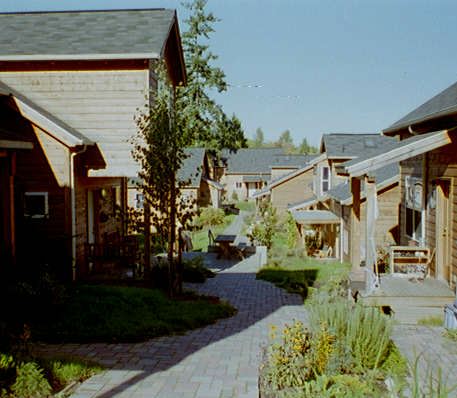 writes how
businesses are seeing that they need a community spirit: "At the Quaker Oats pet food
plant in Topeka, one production worker's performance deteriorated until he finally made a
serious mistake that would have caused some companies to fire him. Instead, three fellow
members of his work team began counseling and working with him on a weekly basis until his
performance was up to par."
writes how
businesses are seeing that they need a community spirit: "At the Quaker Oats pet food
plant in Topeka, one production worker's performance deteriorated until he finally made a
serious mistake that would have caused some companies to fire him. Instead, three fellow
members of his work team began counseling and working with him on a weekly basis until his
performance was up to par."
"The founder of Harbor Sweets, a Massachusetts candy company, insists that his
diverse work force operates on total trust, with no time clocks, no efficiency measures,
and no secrets. Productivity is high because, he says, 'love is good business.'"
"I know this is going to sound sort of hokey, but I work here because of the
family feeling.' says a manager at Levi Strauss & Company in San Francisco. After
twenty-two years with the company, he cannot imagine leaving."
Tom Peters says, "Those few American corporations that manage to convey a
genuine sense of community and belonging to their employees are thriving as a
consequence." Max DePree says, "In most vital organizations, there is a common
bond of interdependence, mutual interest, interlocking contributions, and simple
joy." Shaffer writes, "The ultimate employee-based structure is the
employee-owned company, in which people are literally invested in the firm. More than
11,000 American firms have some sort of employee stock ownership plan (ESOP), and many
also involve employees in running the organization."
Government, businesses, churches and all organizations have a hierarchy. God's way
is to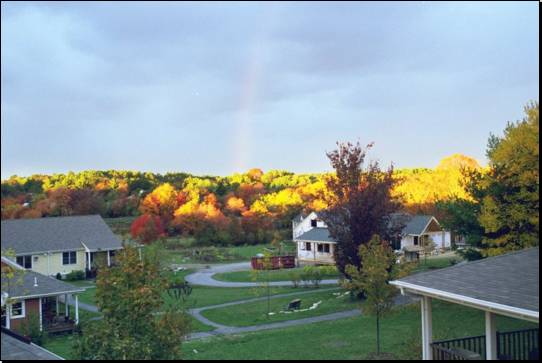 diffuse power, not centralize it. If
organizations from the family level to huge corporations and governments do not empower
those at the bottom, they will fail. The ultimate example is the former Soviet Union and
today's North Korea. They are examples of people who can't even feed themselves, let alone
compete with their neighbors. Men in leadership positions such as husbands, CEOs or the
President of the United States should not be dictatorial, but raise others to be leaders,
to allow for mistakes, to encourage creativity, to be friends with their coworkers. Father
says that when children grow up they are friends to their parents. Elders must be
respected but elders must also respect those under them. True leaders raise people to take
their position so they can go on to other things. Leaders have to make final decisions
sometimes, but they do so after listening respectfully to others. Mainly, he delegates
power and is a teacher and coach. The majority doesn't necessarily rule, but they must
feel they are listened to and respected. The focus is on getting the job done, not titles.
Warren Bennis writes, "An organization should, by definition, function organically,
which means that its purposes should determine its structure, rather than the other way
around, and that it should function as a community rather than a hierarchy, and offer
autonomy to its members, along with tests, opportunities, and rewards, because ultimately
an organization is merely the means, not the end."
diffuse power, not centralize it. If
organizations from the family level to huge corporations and governments do not empower
those at the bottom, they will fail. The ultimate example is the former Soviet Union and
today's North Korea. They are examples of people who can't even feed themselves, let alone
compete with their neighbors. Men in leadership positions such as husbands, CEOs or the
President of the United States should not be dictatorial, but raise others to be leaders,
to allow for mistakes, to encourage creativity, to be friends with their coworkers. Father
says that when children grow up they are friends to their parents. Elders must be
respected but elders must also respect those under them. True leaders raise people to take
their position so they can go on to other things. Leaders have to make final decisions
sometimes, but they do so after listening respectfully to others. Mainly, he delegates
power and is a teacher and coach. The majority doesn't necessarily rule, but they must
feel they are listened to and respected. The focus is on getting the job done, not titles.
Warren Bennis writes, "An organization should, by definition, function organically,
which means that its purposes should determine its structure, rather than the other way
around, and that it should function as a community rather than a hierarchy, and offer
autonomy to its members, along with tests, opportunities, and rewards, because ultimately
an organization is merely the means, not the end."
The 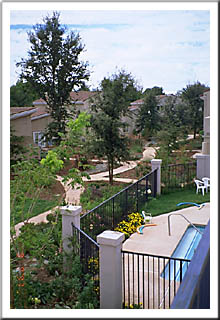 primary community
is the family. Parents are supposed to be living with their adult children as extended
families. We need to return to the way our ancestors lived. And we need to go forward by
living with others of the same faith in privately owned homes and condominiums as Father
commands us. The way Americans live now is ridiculous and tragic. In Cohousing the
authors write, "In previous centuries, households were made up of at least six
people. In addition to having many children, families often shared their homes with
boarders, relatives, or servants. Relatives usually lived nearby. These large households
provided both children and adults with a diverse intergenerational network of
relationships in the home. The idea that the nuclear family should live on its own without
the support and assistance of the extended family or surrounding community is relatively
new, even in the United States."
primary community
is the family. Parents are supposed to be living with their adult children as extended
families. We need to return to the way our ancestors lived. And we need to go forward by
living with others of the same faith in privately owned homes and condominiums as Father
commands us. The way Americans live now is ridiculous and tragic. In Cohousing the
authors write, "In previous centuries, households were made up of at least six
people. In addition to having many children, families often shared their homes with
boarders, relatives, or servants. Relatives usually lived nearby. These large households
provided both children and adults with a diverse intergenerational network of
relationships in the home. The idea that the nuclear family should live on its own without
the support and assistance of the extended family or surrounding community is relatively
new, even in the United States."
Let's grow geometrically
I think that every blessed couple should have at least twelve children. Many women
may not want to physically have that many and some may want to but can't. Therefore, each
couple should save some of the millions of street kids around the world by bringing them
into their homes. We should begin the process of settling down and making roots. Let's say
each family had an average of six boys and six girls. Most, if not all the boys, should
stay together. Their wives form a school to homeschool the children. If each of the six
boys has twelve children then there will be 72 children. The boys build businesses and
attract others to live in their community. Pretty soon there would be enough to have a
city. With so many people in a few generations they would have their own hospital and
theme park. There would be farms to feed everyone and food left over to give to the poor.
These communities will inspire the world. Since most of the girls will follow their
husbands, they will encourage them to build similar communities. Her six brothers will
give money and visit her where she lives to help build a community around her family.
It should be an exception to the rule that boys leave their parents and go live
somewhere else. Just think how much less tragedy there would have been in human history if
men had lived as trinities. Millions of men have had to fight wars, millions have had to
leave to pursue some dream, millions have got sick and countless millions have died
leaving women alone to fend for themselves. Recently I watched a video series on the
pioneers who came on the Oregon Trail. The suffering of mankind has been indescribable. In
one scene the narrator read a passage of a diary of a woman who told of how a few men,
including her husband, had gone out to hunt for some animal for supper, and one of the men
had an accident and died. When she was told this the woman described in her diary the
grief, suffering and terror this woman went through and how terrifying her life had become
as she had to go on with her children in the brutal trail that lay ahead. What if there
were a trinity? She would have had two men to take care of her.
Sometimes 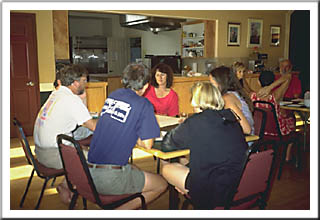 I watch shows of
charitable organizations that ask you for twenty dollars a month to care for a child in a
third world country. I'll never forget one in particular. The famous TV star, Alex Trebek,
was in Bogota, Columbia. In one scene he was surrounded by a dozen boys. It was at night.
He said these boys are street kids who have nothing. He then shined a light on a bunch of
boys, many just 6 or 7 years old who were all asleep and huddled together. He said he had
a coat on and he still felt chilled. The children were in thin rags. You can't help but
cry. Let's get these kids into our homes and be their parents. Let's get our kids to do
the same. We should work with governments to make it easier to get these kids adopted by
families around the world. I met a man recently who was in the navy and he saw in Korea an
orphanage run by Catholic nuns. Outside the house there was a small fence going clear
around the house. During the night people would give their babies away by putting them in
this area. In the morning the nuns would come out and gather up the babies and take them
in. Let's get those babies into our homes.
I watch shows of
charitable organizations that ask you for twenty dollars a month to care for a child in a
third world country. I'll never forget one in particular. The famous TV star, Alex Trebek,
was in Bogota, Columbia. In one scene he was surrounded by a dozen boys. It was at night.
He said these boys are street kids who have nothing. He then shined a light on a bunch of
boys, many just 6 or 7 years old who were all asleep and huddled together. He said he had
a coat on and he still felt chilled. The children were in thin rags. You can't help but
cry. Let's get these kids into our homes and be their parents. Let's get our kids to do
the same. We should work with governments to make it easier to get these kids adopted by
families around the world. I met a man recently who was in the navy and he saw in Korea an
orphanage run by Catholic nuns. Outside the house there was a small fence going clear
around the house. During the night people would give their babies away by putting them in
this area. In the morning the nuns would come out and gather up the babies and take them
in. Let's get those babies into our homes.
The UC is living as isolated nuclear families in single family dwellings. Before,
they lived in communes. Neither one is God's architecture. Formation stage was communes;
growth stage is individual homes; completion stage is living together in communities.
Stephen Covey in 7 Habits of Highly Effective People divides people's growth into three stages: dependent (to me this would be living in
communes), independent (isolated nuclear families), and interdependent (communities).
 Third Blessing is
a dominion of love where everyone lives as one huge family. A family takes care of the
weak. A family is sensitive to the individual. The UC needs to create deep love between
the members as friends who will die for each other. This will only happen when members
live close together in trinities and groups of trinities. UC members in America haven't
lived in trinities because there was no stability. Everything was so mobile no one could
get roots and form a community. We have been like gypsies camped outside town. Now it's
time to go into Canaan and build a stronger community than others. It's
time to sink roots, instead of pulling them up. One of the curses of the UC and 20th
century America has been it mobility. The good side was that travel can help a person to
not get provincial and open up to other types of people. The negatives far outweigh the
positives in losing extended families and communities. For most people the grass wasn't greener on the other hill. Robert Nisbet in Twilight of
Authority says that America gave up its focus on local community and even disparaged
it in the 1920s. This is the trend I have written of in my books that show how America
threw out so many good things from the Victorians. Nisbet says, "World
War I is, I think, the sharp dividing line. Afterward interest in local community did not
attain its earlier intensity, flavor, and eloquence. The influence of
Third Blessing is
a dominion of love where everyone lives as one huge family. A family takes care of the
weak. A family is sensitive to the individual. The UC needs to create deep love between
the members as friends who will die for each other. This will only happen when members
live close together in trinities and groups of trinities. UC members in America haven't
lived in trinities because there was no stability. Everything was so mobile no one could
get roots and form a community. We have been like gypsies camped outside town. Now it's
time to go into Canaan and build a stronger community than others. It's
time to sink roots, instead of pulling them up. One of the curses of the UC and 20th
century America has been it mobility. The good side was that travel can help a person to
not get provincial and open up to other types of people. The negatives far outweigh the
positives in losing extended families and communities. For most people the grass wasn't greener on the other hill. Robert Nisbet in Twilight of
Authority says that America gave up its focus on local community and even disparaged
it in the 1920s. This is the trend I have written of in my books that show how America
threw out so many good things from the Victorians. Nisbet says, "World
War I is, I think, the sharp dividing line. Afterward interest in local community did not
attain its earlier intensity, flavor, and eloquence. The influence of  Woodrow Wilson and his New Freedom in this country and of Lenin
in European radical thought had a great deal to do with turning revolutionary and
progressive thought away from its concern with locality or, for that matter, any of the
smaller unities. The nation, the centralized nation freed of local community became the
symbol of reaction, dullness, mediocrity, and oppression of mind. Sinclair Lewis's Main Street, Babbitt, and other novels were only the
most popular of a literature in the 1920's that satirized, caricatured, and pilloried the
village or small town. And such rendering of local roots was in keeping with the
increasing nationalism to be seen in the social sciences, in education, and in government
policy from World War I on."
Woodrow Wilson and his New Freedom in this country and of Lenin
in European radical thought had a great deal to do with turning revolutionary and
progressive thought away from its concern with locality or, for that matter, any of the
smaller unities. The nation, the centralized nation freed of local community became the
symbol of reaction, dullness, mediocrity, and oppression of mind. Sinclair Lewis's Main Street, Babbitt, and other novels were only the
most popular of a literature in the 1920's that satirized, caricatured, and pilloried the
village or small town. And such rendering of local roots was in keeping with the
increasing nationalism to be seen in the social sciences, in education, and in government
policy from World War I on." Let's play with numbers. If every UC
family had an average of ten children by themselves or by adopting, and each of those
children had 10 children, there would be 100 grandchildren. The next generation would be
1000, then 10,000, then 100,000 then one million. Within a few generations one couple
could have a large city of just their descendants. If every UC couple had more than 10
children, and I assume many would want to adopt from third world countries, just think of
the joy it would bring to God to save those children and to see His family become the most
powerful and exciting group on earth.
Let's play with numbers. If every UC
family had an average of ten children by themselves or by adopting, and each of those
children had 10 children, there would be 100 grandchildren. The next generation would be
1000, then 10,000, then 100,000 then one million. Within a few generations one couple
could have a large city of just their descendants. If every UC couple had more than 10
children, and I assume many would want to adopt from third world countries, just think of
the joy it would bring to God to save those children and to see His family become the most
powerful and exciting group on earth.  more people are
beginning to realize that life is better in a community. There are more and more books on
the subject. Carolyn Shaffer writes in Creating Community Anywhere: "Only two
or three generations ago, community was a fact of life for most people. Neighbors left
their doors open, helped each other build things, and kept an eye out for one another's
well-being. In 1930, less than eight percent of American households consisted of a single
person, and many families occupied the same house for generations."
more people are
beginning to realize that life is better in a community. There are more and more books on
the subject. Carolyn Shaffer writes in Creating Community Anywhere: "Only two
or three generations ago, community was a fact of life for most people. Neighbors left
their doors open, helped each other build things, and kept an eye out for one another's
well-being. In 1930, less than eight percent of American households consisted of a single
person, and many families occupied the same house for generations." opportunities in the larger world, now find it necessary to work outside the
home as well. Neither women nor men feel they have much time to maintain the ties of
mutual support. It is commonplace for families as well as singles to have little or no
contact with others who live only a door or two away."
opportunities in the larger world, now find it necessary to work outside the
home as well. Neither women nor men feel they have much time to maintain the ties of
mutual support. It is commonplace for families as well as singles to have little or no
contact with others who live only a door or two away." writes how
businesses are seeing that they need a community spirit: "At the Quaker Oats pet food
plant in Topeka, one production worker's performance deteriorated until he finally made a
serious mistake that would have caused some companies to fire him. Instead, three fellow
members of his work team began counseling and working with him on a weekly basis until his
performance was up to par."
writes how
businesses are seeing that they need a community spirit: "At the Quaker Oats pet food
plant in Topeka, one production worker's performance deteriorated until he finally made a
serious mistake that would have caused some companies to fire him. Instead, three fellow
members of his work team began counseling and working with him on a weekly basis until his
performance was up to par." diffuse power, not centralize it. If
organizations from the family level to huge corporations and governments do not empower
those at the bottom, they will fail. The ultimate example is the former Soviet Union and
today's North Korea. They are examples of people who can't even feed themselves, let alone
compete with their neighbors. Men in leadership positions such as husbands, CEOs or the
President of the United States should not be dictatorial, but raise others to be leaders,
to allow for mistakes, to encourage creativity, to be friends with their coworkers. Father
says that when children grow up they are friends to their parents. Elders must be
respected but elders must also respect those under them. True leaders raise people to take
their position so they can go on to other things. Leaders have to make final decisions
sometimes, but they do so after listening respectfully to others. Mainly, he delegates
power and is a teacher and coach. The majority doesn't necessarily rule, but they must
feel they are listened to and respected. The focus is on getting the job done, not titles.
Warren Bennis writes, "An organization should, by definition, function organically,
which means that its purposes should determine its structure, rather than the other way
around, and that it should function as a community rather than a hierarchy, and offer
autonomy to its members, along with tests, opportunities, and rewards, because ultimately
an organization is merely the means, not the end."
diffuse power, not centralize it. If
organizations from the family level to huge corporations and governments do not empower
those at the bottom, they will fail. The ultimate example is the former Soviet Union and
today's North Korea. They are examples of people who can't even feed themselves, let alone
compete with their neighbors. Men in leadership positions such as husbands, CEOs or the
President of the United States should not be dictatorial, but raise others to be leaders,
to allow for mistakes, to encourage creativity, to be friends with their coworkers. Father
says that when children grow up they are friends to their parents. Elders must be
respected but elders must also respect those under them. True leaders raise people to take
their position so they can go on to other things. Leaders have to make final decisions
sometimes, but they do so after listening respectfully to others. Mainly, he delegates
power and is a teacher and coach. The majority doesn't necessarily rule, but they must
feel they are listened to and respected. The focus is on getting the job done, not titles.
Warren Bennis writes, "An organization should, by definition, function organically,
which means that its purposes should determine its structure, rather than the other way
around, and that it should function as a community rather than a hierarchy, and offer
autonomy to its members, along with tests, opportunities, and rewards, because ultimately
an organization is merely the means, not the end." primary community
is the family. Parents are supposed to be living with their adult children as extended
families. We need to return to the way our ancestors lived. And we need to go forward by
living with others of the same faith in privately owned homes and condominiums as Father
commands us. The way Americans live now is ridiculous and tragic. In Cohousing the
authors write, "In previous centuries, households were made up of at least six
people. In addition to having many children, families often shared their homes with
boarders, relatives, or servants. Relatives usually lived nearby. These large households
provided both children and adults with a diverse intergenerational network of
relationships in the home. The idea that the nuclear family should live on its own without
the support and assistance of the extended family or surrounding community is relatively
new, even in the United States."
primary community
is the family. Parents are supposed to be living with their adult children as extended
families. We need to return to the way our ancestors lived. And we need to go forward by
living with others of the same faith in privately owned homes and condominiums as Father
commands us. The way Americans live now is ridiculous and tragic. In Cohousing the
authors write, "In previous centuries, households were made up of at least six
people. In addition to having many children, families often shared their homes with
boarders, relatives, or servants. Relatives usually lived nearby. These large households
provided both children and adults with a diverse intergenerational network of
relationships in the home. The idea that the nuclear family should live on its own without
the support and assistance of the extended family or surrounding community is relatively
new, even in the United States." I watch shows of
charitable organizations that ask you for twenty dollars a month to care for a child in a
third world country. I'll never forget one in particular. The famous TV star, Alex Trebek,
was in Bogota, Columbia. In one scene he was surrounded by a dozen boys. It was at night.
He said these boys are street kids who have nothing. He then shined a light on a bunch of
boys, many just 6 or 7 years old who were all asleep and huddled together. He said he had
a coat on and he still felt chilled. The children were in thin rags. You can't help but
cry. Let's get these kids into our homes and be their parents. Let's get our kids to do
the same. We should work with governments to make it easier to get these kids adopted by
families around the world. I met a man recently who was in the navy and he saw in Korea an
orphanage run by Catholic nuns. Outside the house there was a small fence going clear
around the house. During the night people would give their babies away by putting them in
this area. In the morning the nuns would come out and gather up the babies and take them
in. Let's get those babies into our homes.
I watch shows of
charitable organizations that ask you for twenty dollars a month to care for a child in a
third world country. I'll never forget one in particular. The famous TV star, Alex Trebek,
was in Bogota, Columbia. In one scene he was surrounded by a dozen boys. It was at night.
He said these boys are street kids who have nothing. He then shined a light on a bunch of
boys, many just 6 or 7 years old who were all asleep and huddled together. He said he had
a coat on and he still felt chilled. The children were in thin rags. You can't help but
cry. Let's get these kids into our homes and be their parents. Let's get our kids to do
the same. We should work with governments to make it easier to get these kids adopted by
families around the world. I met a man recently who was in the navy and he saw in Korea an
orphanage run by Catholic nuns. Outside the house there was a small fence going clear
around the house. During the night people would give their babies away by putting them in
this area. In the morning the nuns would come out and gather up the babies and take them
in. Let's get those babies into our homes.